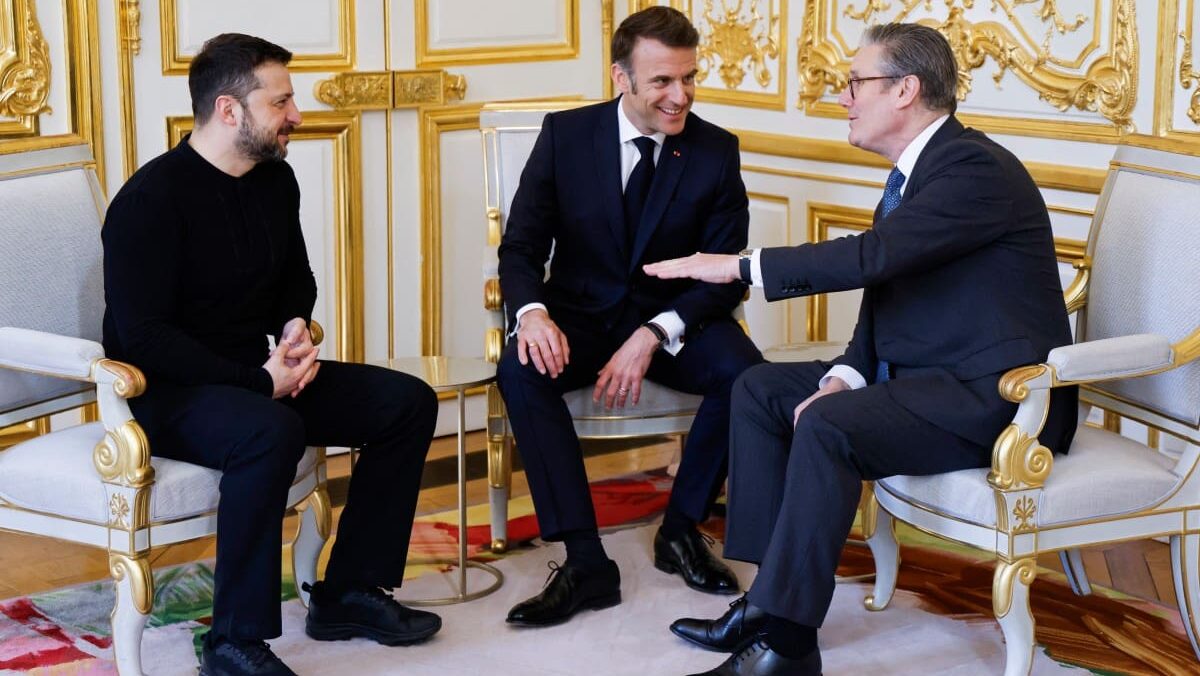
Emmanuel Macron plans to send European “reassurance forces” to “certain strategic locations” in Ukraine if a peace treaty with Russia is reached. This announcement—which self-consciously avoids using the label ‘peacekeeping force’—came out of the latest European meeting, held on Thursday, March 27th.
This latest gambit reflects desperation as the French and British leaders attempt to assert relevance in a world where Brussels is sidelined and Washington and Moscow quietly redraw the geopolitical map, specifically energy, for mutual benefit.
“Peace through strength” shows a Europe struggling to reconcile its lofty ideals with the harsh realities of a crumbling Ukrainian front and a global order slipping from its grasp.
The Paris summit, hosted by Macron and attended by more than 30 world leaders, was billed as a decisive step toward a “just and lasting peace” in Ukraine. Macron announced the deployment of a Franco-British delegation to Ukraine to explore a potential peacekeeping force, a move co-piloted with Starmer, who emphasized on March 3rd that
Europe is mobilizing on a scale not seen in decades.
The so-called Coalition of the Willing aims to bolster Ukraine’s military capabilities and secure its airspace and maritime routes. By taking the announcement at face value, some estimates are suggesting a force of 10,000 to 30,000 troops, possibly equipped with fighter jets and naval patrols. Macron insists that “there will be a security force” in Ukraine. However, he clarified it would not replace Ukrainian troops or engage directly on the front lines, indicating that the proposal is more performative than capable of deterring Russia.
In part, this bold-sounding initiative is unlikely to progress because direct U.S.-Russian peace talks are setting the pace for any end to the conflict. If not for the real weakness of demoralized, underprepared Anglo-French militaries, it is further hampered by a lack of consensus within Europe. Macron himself admitted there is “no unanimity among the partners on the guarantee forces,” acknowledging the deep fissures within the EU and NATO. Poland’s Prime Minister Donald Tusk has voiced cautious support for maintaining sanctions on Russia.
Elsewhere, countries like Italy and Spain remain hesitant to commit troops. For instance, Spanish prime minister Pedro Sánchez dodged any firm pledge, offering only vague platitudes about a “just and durable peace.” The Spanish prime minister avoids talking about rearmament because it “inconveniences” his far-left and separatist government partners. Meanwhile, he juggles with words.
Hungary sticks to its position, with Tusk noting the need for a unified EU policy toward Russia “even if Hungary does not agree.” This fragmentation underscores the fragility of Macron and Starmer’s leadership bid—Europe speaks with many voices, few of them in harmony.
A separate shift unfolding beyond Europe’s borders threatens to make Macron and Starmer’s efforts still more redundant. In a March 25th interview with Channel One, Russian Foreign Minister Sergey Lavrov revealed that Russia and the United States are discussing the reactivation of the Nord Stream pipelines. This move would see Washington, not Europe, controlling the flow of Russian gas. In a statement that has shocked the EU, Lavrov mused
It will be interesting if the Americans use their influence over Europe and force it not to reject Russian gas.
The implications are profound: the U.S., once a staunch opponent of Nord Stream, could now profit from transit fees while Russia regains a foothold in Europe’s energy market. This pragmatic deal, driven by mutual self-interest, bypasses Brussels entirely, exposing its waning influence. The approximate total cost of the two pipelines is €16.9 billion, with Germany picking up much of the tab. To the astonishment of European observers, this investment might now turn out to be wasted.
Unsurprisingly, the EU’s reaction has been one of outrage—and impotence.
